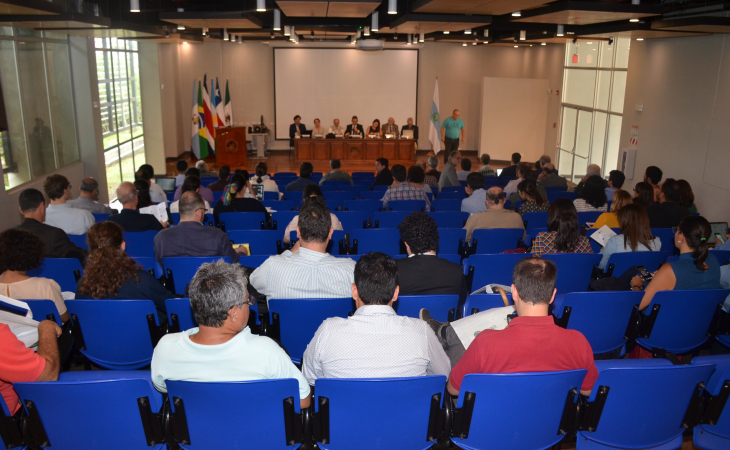The agreement is called “San José Charter” and was signed at the University of Costa Rica (UCR) on August 7.

During the meeting of representatives of advanced study centers in Latin America at the UCR, the cooperation agreement “Carta de San José” was signed and the “Transdisciplinary Research and International Cooperation” conversation was held.
It was signed by the Institute for Advanced Studies of the University of San Paulo, Brazil; the Center for Advanced Latin American Studies of the University of Guadalajara (CALAS); the Center for Advanced Multidisciplinary Studies of the University of Brasilia (CEAM), Brazil: the Institute for Advanced Studies of the Coast of the National University of the Coast, Argentina; the Institute for Advanced Studies of the University of Santiago, Chile (IDEA); and the University Space for Advanced Studies (UCREA), of the UCR.
The objective of the “San José Charter” is to promote academic cooperation in conditions of reciprocity between the centers and institutes.
In addition, the agreement stipulates “it is proposed to promote cutting-edge inter and transdisciplinary research, the consolidation of spaces for dialogue around scientific, social, cultural and environmental challenges; contribute to innovation in university work; promote the internationalization of research; seek a solution to the local and regional problems of our societies and the improvement of the quality of life; and reciprocal cooperation with advanced study institutes in other regions.”
The Charter proposes short, medium and long-term goals (SEE TEXT BOX), among which the culmination would be the creation of a network of advanced study institutes in Latin America that encompasses institutes, centers, spaces and advanced study programs in the subcontinent.
The agreement was signed in the framework of the "Workshop on the Institutes of Advanced Studies of Latin America", held at the UCR on August 5, 6, and 7.
Within the framework of the workshop, the “Transdisciplinary Research and International Cooperation” discussion panel was held; open to all audiences on Tuesday, August 6 at the auditorium,1st floor of the College of Science in the Research City of the UCR.
Both activities were organized by the University Space for Advanced Studies (UCREA), at UCR with the support from the Vice-Rectory of Research of this University.
Invited experts from several countries participated in this discussion: Dr. Nielsen Pires from the Center for Advanced Multidisciplinary Studies, University of Brasilia, Brazil; Dr. Patricia Alejandra Pallavicini Director of the Institute for Advanced Studies, University of Santiago, Chile; Dr. Guilherme Ary Plonski Deputy Director of the Institute for Advanced Studies, University of São Paulo, Brazil and member of the UCREA Academic Council of the UCR; Dr. Sarah Corona-Berkin Director of the Center for Advanced Latin American Studies, University of Guadalajara, Mexico; Dr. Gonzalo Sozzo Vice-Dean and professor of the Faculty of Legal and Social Sciences of the Institute of Advanced Studies of the Coast of the National University of the Coast, Argentina.
The foreign guests were accompanied at the main table by Dr. Fernando García-Santamaría, Vice-Rector of Research of the University of Costa Rica and by Dr. Javier Trejos-Zelaya, coordinator of UCREA.
Taking advantage of the visit of these experts to the country, together with Dr. Maria Lucia Pinto-Leal Coordinator of the Center for Advanced Multidisciplinary Studies of the University of Brasilia, Brazil; Dr. Fernando Quevedo-Rodríguez Director of the International Center for Theoretical Physics in Trieste, Italy and professor at the University of Cambridge in the United Kingdom; as well as Dr. Martin Grossmann, director of the Institute for Advanced Studies of the University of São Paulo, Brazil, the aforementioned workshop "On the Institutes of Advanced Studies of Latin America” was also held.
The objective of the workshop is to insert UCREA into the international network of advanced studies institutes in the future, following the model of the European netIAS network, which initially functioned as a platform to obtain funds for scholarships and internships. Then it became a scenario for the exchange of knowledge and development of interdisciplinary projects that gives visibility to the work done by study and research centers.
With this objective, the UCR will propose, in 2020, the affiliation of UCREA to UBIAS the consortium of Institutes for Advanced Studies based on Universities (University-Based Institutes for Advanced Study).
The main objectives of the meeting of these international experts in our country are: Describe and establish perspectives on the participation of the different institutes in the scientific, social and cultural activities of the region; reflect on initiatives that contribute to the production of knowledge in the context of the so-called “Global South”, which includes all the low and middle income countries of the planet.
UCREA is a meeting place and space for discussion and exchange for the academic staff of UCR that overflows purely disciplinary activities, in permanent interaction with academics from around the world, with a thematic scope equally open to the arts, natural sciences, humanities and social sciences.

Directors and researchers from important centers of advanced studies in Latin America shared their experiences with researchers from the UCR, both during the “Transdisciplinary Research and International Cooperation” discussion panel, and during the Workshop on the Institutes of Advanced Studies in Latin America.
For more information, visit the site: www.ucrea.ucr.ac.cr or call UCREA coordinator Dr.Javier Trejos-Zelaya, at (506) 2511-6345.
NETWORK COOPERATION AGENDA |
|---|
|
Short term |
|
Socialize evaluating peer banks |
|
Socialize the list of residents and interns (Fellows) |
|
Socialize research projects in progress: current and finalized |
|
Mid term |
|
Organize joint activities |
|
Generate the circulation of guest speakers |
|
Develop a joint strategy to obtain international funding |
|
Exchange of researchers and doctoral students |
|
Long term |
|
Establish a joint chair of the institutes of advanced studies in Latin America |
|
Produce a joint academic publication |